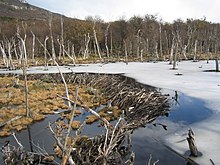Our website is made possible by displaying online advertisements to our visitors.
Please consider supporting us by disabling your ad blocker.
Portal:Ecology
| |
|
|
Ecology
|
|
Ecology (from Ancient Greek οἶκος (oîkos) 'house' and -λογία (-logía) 'study of') is the natural science of the relationships among living organisms and their environment. Ecology considers organisms at the individual, population, community, ecosystem, and biosphere levels. Ecology overlaps with the closely related sciences of biogeography, evolutionary biology, genetics, ethology, and natural history. Ecology is a branch of biology, and is the study of abundance, biomass, and distribution of organisms in the context of the environment. It encompasses life processes, interactions, and adaptations; movement of materials and energy through living communities; successional development of ecosystems; cooperation, competition, and predation within and between species; and patterns of biodiversity and its effect on ecosystem processes. Ecology has practical applications in conservation biology, wetland management, natural resource management (agroecology, agriculture, forestry, agroforestry, fisheries, mining, tourism), urban planning (urban ecology), community health, economics, basic and applied science, and human social interaction (human ecology). The word ecology (German: Ökologie) was coined in 1866 by the German scientist Ernst Haeckel. The science of ecology as we know it today began with a group of American botanists in the 1890s. Evolutionary concepts relating to adaptation and natural selection are cornerstones of modern ecological theory. Ecosystems are dynamically interacting systems of organisms, the communities they make up, and the non-living (abiotic) components of their environment. Ecosystem processes, such as primary production, nutrient cycling, and niche construction, regulate the flux of energy and matter through an environment. Ecosystems have biophysical feedback mechanisms that moderate processes acting on living (biotic) and abiotic components of the planet. Ecosystems sustain life-supporting functions and provide ecosystem services like biomass production (food, fuel, fiber, and medicine), the regulation of climate, global biogeochemical cycles, water filtration, soil formation, erosion control, flood protection, and many other natural features of scientific, historical, economic, or intrinsic value. (Full article...) Selected article -Evolution is the change in the heritable characteristics of biological populations over successive generations. It occurs when evolutionary processes such as natural selection and genetic drift act on genetic variation, resulting in certain characteristics becoming more or less common within a population over successive generations. The process of evolution has given rise to biodiversity at every level of biological organisation. The scientific theory of evolution by natural selection was conceived independently by two British naturalists, Charles Darwin and Alfred Russel Wallace, in the mid-19th century as an explanation for why organisms are adapted to their physical and biological environments. The theory was first set out in detail in Darwin's book On the Origin of Species. Evolution by natural selection is established by observable facts about living organisms: (1) more offspring are often produced than can possibly survive; (2) traits vary among individuals with respect to their morphology, physiology, and behaviour; (3) different traits confer different rates of survival and reproduction (differential fitness); and (4) traits can be passed from generation to generation (heritability of fitness). In successive generations, members of a population are therefore more likely to be replaced by the offspring of parents with favourable characteristics for that environment. (Full article...) Selected image - Credit: Mnolf A Venus Flytrap (Dionaea muscipula) closing after receiving a stimulus. Venus Flytraps are carnivorous plants that catch and digest animal prey—mostly insects and arachnids.
General imagesThe following are images from various ecology-related articles on Wikipedia.
Related WikiProjectsThings you can do
Entries here consist of Good and Featured articles, which meet a core set of high editorial standards.
 An invasive species is an introduced species that harms its new environment. Invasive species adversely affect habitats and bioregions, causing ecological, environmental, and/or economic damage. The term can also be used for native species that become harmful to their native environment after human alterations to its food web. Since the 20th century, invasive species have become serious economic, social, and environmental threats worldwide. Invasion of long-established ecosystems by organisms is a natural phenomenon, but human-facilitated introductions have greatly increased the rate, scale, and geographic range of invasion. For millennia, humans have served as both accidental and deliberate dispersal agents, beginning with their earliest migrations, accelerating in the Age of Discovery, and accelerating again with international trade. Notably invasive plant species include the kudzu vine, giant hogweed, Japanese knotweed, and yellow starthistle. Notably invasive animals include European rabbits, domestic cats, and carp. (Full article...) Selected biography -John Stanley Beard (15 February 1916 – 17 February 2011) was a British-born forester and ecologist who resided in Australia. Beard studied at the University of Oxford where he completed his doctoral thesis on tropical forestry. While working with the Forestry Division in Trinidad and Tobago during the 1940s, Beard developed a system of forest classification for Tropical America and described the forests of Trinidad, Tobago, and the Lesser Antilles; these descriptions remain standard references on the topics. (Full article...) Did you know (auto-generated)
Selected quote -
Ecology news
Additional News Highlights
Selected publication -Frontiers in Ecology and the Environment is a peer-reviewed scientific journal. It is published ten times per year by the Ecological Society of America and is its official journal. Its focus is on present day concerns pertaining to ecological and environmental issues. (Full article...) Related portalsMore did you know -Related articlesAssociated WikimediaThe following Wikimedia Foundation sister projects provide more on this subject:
Web resourcesPreview warning: Page using Template:Div col with unknown parameter "1 = 2"; use colwidth= to specify column size
Discover Wikipedia using portals |
- ^ "Data Sources". Global Footprint Network. 2010-02-05. Retrieved 2010-02-05.
Previous Page Next Page
















































